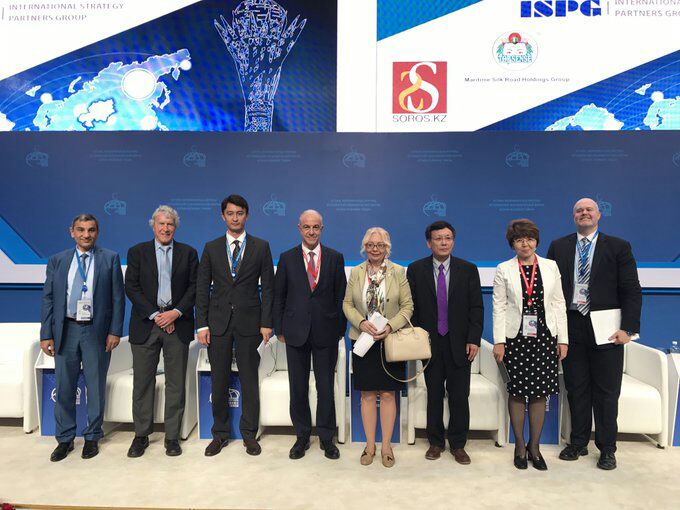Economic mirror of the day

On June 15-16 the tenth anniversary Astana Forum was successfully held, where your obedient servant, as the founder and head of the Institute for Global Economic Problems, was honoured to be present and participate in plenary sessions and discussions.
The main theme this year was: "New energy. New Economy ". Some 20-panel sessions, roundtables and conferences were planned and conducted. Important topics that have been discussed over the past few years throughout the world and on all such platforms are globalisation, integration processes and the world economy.
The author of the publication participated in the sessions on "The next chapter of globalisation: the time of uncertainties". It was noted that our capitalist model should be transformed into a more stable and fair economic model. Today, the entire industry and economies of countries are subject to technological changes. And international institutions, and the current government, and non-profit associations, and multinational corporations should make an effort to transform capitalism into a more inclusive and sustainable form, contribute to accelerated inclusive growth and to provide benefits to both developed and developing economies.
I listened with interest to the report of the economic adviser to the President of the Russian Federation, Academician S.Y. Glazyev, with whom after the session I had a chance to personally discuss some issues. It was noted that global financial markets continue to face high levels of uncertainty due to the negative impact associated with the slowdown in global trade and productivity, as well as the growing level of protectionism that adds pessimism to the global economic recovery.
The moderator of the section was Mark Uzan, the founder and executive director of the Bretton Woods renewal committee. He stated that many groups play an important role in the stability of the financial system. If earlier it was a question of the concept of world finance as one economy - the US and European economy as a nucleus, and the rest of the world was called the periphery, today this concept does not make sense.
It was stressed that the consequences of changes in the global economic and financial world by the US macroeconomic policy, which will depend more on fiscal stimulus and at the same time indicating the end of the cycle of low interest rates, will stimulate the strengthening of the dollar.
China's world-renowned economics professor David Daokui Li devoted an impeccable role to the world economy of China. Against the background of growing protectionism processes, China is rapidly promoting the strategy of the economic belt around the countries of the Great Silk Road "One belt and one way", capable of bringing the annual trade turnover between China and the countries of the "Silk Road" to 2.5 trillion. US dollars (Xi Jinping's speech at the BAF Forum in 2015).
Investments along the economic belt of the "Silk Road" can have a significant impact on Eurasia by creating new opportunities through increased cooperation and openness for new markets. The discussions were aimed at discussing the role of the economic belt initiative along the Silk Road in promoting new mechanisms for global trade and investment. This session was attended by John Perkins, economic advisor and author of the book "Confessions of an Economic Murderer". The most vivid quote was the expression "We created the economy of death. The economy, which is based on the destruction of resources and the exploitation of the Earth. "
The flagship session "Transformation of Capitalism for an inclusive and sustainable future" was also visited by the adviser to the French President, Jean-Marie Cambaceres, general views on some issues with which I laid, I hope, the foundation of lasting friendship.
Integration issues were also touched upon, in one of the sessions of which I took part. The moderator was the Managing Director of the EBRD, Mr Mattia Romani, whom I invited to Baku, and Mr. Wencai Zhang, Vice- President of the Asian Development Bank.
A great interest was caused by the speech of Prof. Mr Peter Frankopan of Oxford University.
It becomes obvious that the interaction between the three components of globalisation (trade, capital and people) can create both positive and negative effects with an impact on growth and well-being. To avoid negative consequences, the president of Azerbaijan clearly outlined the contours of economic stability and competitiveness.
In the context of globalisation, the problem of competition between state mechanisms is becoming partially topical. The fact is that in the emerging world economic system, capital, both material and intellectual, tends to areas where conditions are most favourable. The competitiveness of goods and services also depends on the level of transaction costs in a given country. In other words, the countries in which the state mechanism is more efficient will prosper and conquer the world market, while those in which the state is ineffective will become poorer and be ousted.
The outflow of capital and the “brain drain” will inevitably occur in favour of countries with good governance. This is the trend. Therefore, the ideology of the state as a service centre” providing public services is becoming more and more entrenched today. And in services, as we know, the most important thing is quality, the efficiency and affordability.Thats why Azerbaijan bets on improving the efficiency of public administration and minimising the administrative burden on business. This is a mandatory condition for development regardless of which strategy we choose.
To the main topic : Using a pleasant coincidence, I visited an international exhibition. More than 130 pavilions opened the doors to visitors, half of them I managed to visit. The pavilions of the USA, Germany, China, South Korea, Japan, Kazakhstan and Azerbaijan clearly stood out among the rest. In the pavilion of our country there was a high standard, set by the leaders of the republic, the features of the Aliyevs.
Ph.D Natig Shirinzade
The owner & Chairman the Institute of Global Economical Problems


